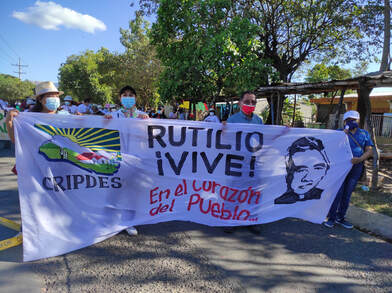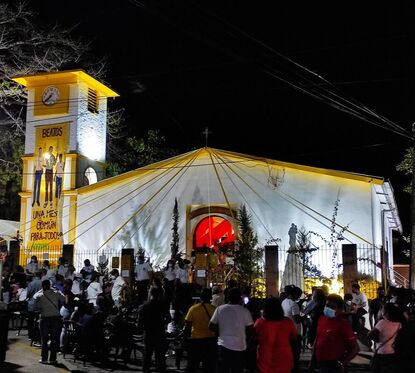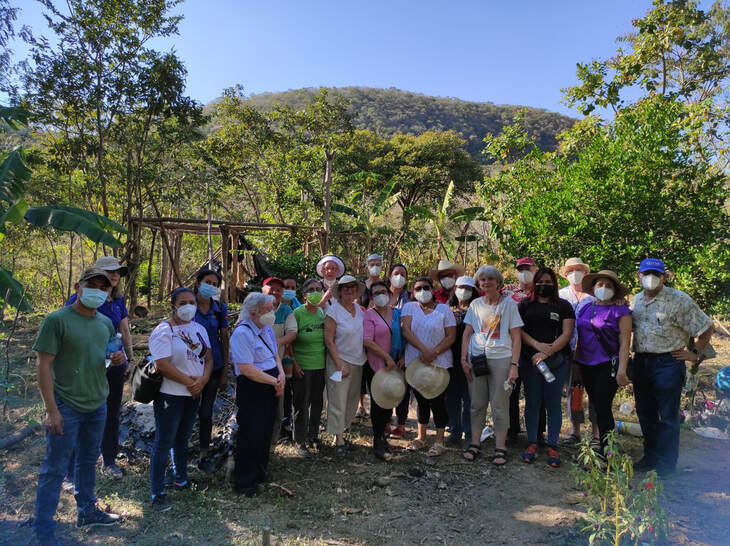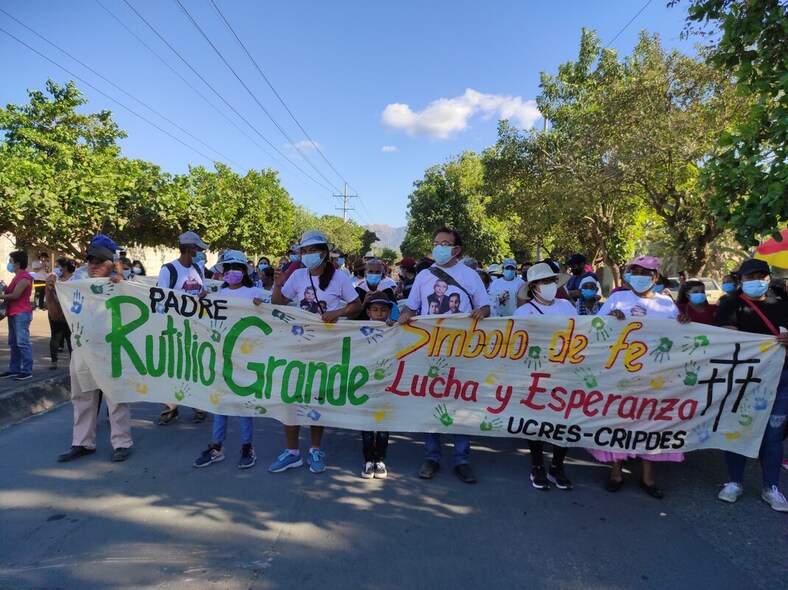|
Hermana Maureen Wild  Si pudiera ver con suficiente claridad a través de la puerta de mi corazón, con su profunda gratitud por este viaje y los momentos que profundamente me conmovieron, quisiera contarles algo maravilloso. Me gustaría que imaginaran el crescendo del canto de los pájaros que nos recibió mientras amanecía e íbamos saliendo del aeropuerto de San Salvador. Quisiera que escucharan las canciones del corazón de quienes hablaron a nuestra Delegación: acordes distintos de compromiso absoluto con el bien común, con melodías que afirman la dignidad de todos y los derechos humanos básicos, notas de anhelo por la salud de los sin voz y vulnerables, por la liberación de presos injustamente detenidos, por la justa distribución de la riqueza nacional para las necesidades de los pobres, y la música extraordinaria de la organización por el bienestar de las comunidades, inclusive de la Madre Tierra. En nuestra tercera mañana nos despertamos con un increíble amanecer en la costa. Todo esto fue parte de una maravillosa sinfonía de nuestra primera semana. Todo esto, y la música de la vida de cuatro mártires, tres salvadoreños y uno italiano, Fray Franciscano Cosme Spessotto, misionero en El Salvador durante treinta años, amante del Evangelio y de los más pobres. Antes de partir en este viaje, ya escuchaba el canto del gran amor mientras leía una biografía de Rutilio Grande, SJ. Quien nació y creció entre los campesinos, latinos pobres trabajadores agrícolas de El Paisnal. Su educación y años de formación como jesuita, abrieron de forma natural y completa su corazón y su mente para abrazar la visión del Concilio Vaticano II: ver a la iglesia como 'el pueblo de Dios' trabajando juntos como comunidad (más que como jerarquía) con una opción preferencial por los pobres. Rutilio trabajó para empoderar a los campesinos analfabetos, sin dinero y sin tierra para organizarse por mejores condiciones de vida y de trabajo. Formó catequistas para servir al pueblo. A través de las enseñanzas del Evangelio, el Vaticano II y la implementación de la visión de Medellín, alentó una nueva vida en su parroquia, incluso organizando una fiesta de cosecha en la iglesia, donde todos se sentaban a la mesa y nadie pasaba hambre. Murió mártir, sirviendo humildemente y amando a los pobres del campo donde nació. Cada vez más me sentí atraída a presenciar con los salvadoreños, esta gozosa y trascendental Beatificación, mientras sentía una tremenda gratitud al Papa Francisco por también exaltar a Manuel y Nelson (quienes apoyaban en los ministerios parroquiales y murieron junto a Rutilio) tan representativos de 'la Iglesia de Rutilio.” El día de su Beatificación, 'Rutilio Vive' fue un mensaje de las mantas en El Paisnal, para que todos la viéramos. Caminamos junto al pueblo, detrás de esta y otras mantas, solidarios, conscientes y agradecidos por todos los Rutilios -hombres y mujeres- que fueron martirizados tras su muerte. Un momento importante para mí, fue conocer a jóvenes y adultos católicos en Aguilares y en la comunidad de Rutilio Grande cerca de El Paisnal. Estaban totalmente dedicados a la elaboración de mantas y pupusas para la Beatificación. Quienes también son parte de comités organizados para abordar las necesidades de los jóvenes, las mujeres, la salud y la seguridad alimentaria en sus comunidades. Fue inspirador presenciar su compromiso con la vida y el cuidado de sus comunidades. A diferencia del creciente individualismo de nuestra cultura, ellos parecían decididos y motivados por el bien común. La Fundación Salvadoreña de Ayuda Humanitaria, Investigación, Educación (Fundación SHARE) coordinacon todos los grupos que visitamos, apoyando proyectos a través de la recaudación de fondos. Dondequiera que los grupos hablaron, expresaron su gratitud a SHARE y a sus décadas de solidaridad con el pueblo salvadoreño. ¡Basta con decir que fue un gran regalo y una primera semana bendecida de innumerables maneras! Nuestros muchos encuentros se relacionaron muy bien con el espíritu de los mártires de El Salvador, capturado en las palabras de Jesús: 'Vengan, benditos, entren en el reino de Dios, porque tuve hambre y me dieron de comer, sed y ustedes... forasteros y ustedes... enfermos. o en la cárcel, y me visitasteis.' by Sister Maureen Wild  If I could see clearly enough through the doorway of my heart, with its profound gratitude for this journey and the moments that moved me deeply, I would want to tell you something wonderful. I would want you to imagine the crescendo of birdsong that greeted us as dawn broke and we stepped outside San Salvador airport. I would want you to hear the heart songs within those who spoke to our Delegation: distinct chords of absolute commitment to the common good, with melodies affirming everyone’s dignity and basic human rights, notes of yearning for the health of voiceless and vulnerable others, for the release of prisoners unjustly detained, for fair distribution of national wealth for the needs of the poor, and the extraordinary music of organizing for the well-being of communities inclusive of Mother Earth. On our third morning we awakened to an amazing coastal sunrise. All this was part of a wonderful symphony of our first week. All of this, and the music of the lives of four martyrs – three Salvadoran-born, and one Italian-born, Franciscan Friar Cosme Spessotto, missioned in El Salvador for thirty years, who loved the Gospel and the poorest. Before I left on this trip, I was already hearing the song of great love while reading a biography of Rutilio Grande, SJ. He was born and raised among the campesinos, poor Latino farm workers, of El Paisnal. His upbringing, and formative years as a Jesuit, naturally and completely opened his heart and mind to embrace the vision of Vatican II: to see the church as ‘the people of God’ working together as community (rather than as hierarchy) with a preferential option for the poor. Rutilio worked to empower illiterate, penniless, landless campesinos to organize for better living and working conditions. He formed catechists to serve the people. Through the teachings of the Gospel, Vatican II and implementing the vision of Medellín*, he encouraged new life in his parish, even to hosting a harvest feast in the church where all sat at the table, and no one went hungry. He died a martyr, humbly serving and loving the rural poor of his birthplace. More and more I felt drawn to witness, with Salvadorans, this joyful and momentous Beatification while feeling tremendous gratitude to Pope Francis for also lifting-up Manuel and Nelson (who assisted in parish ministries and died alongside Rutilio) so representative of ‘the Church of Rutilio.’ On the day of his Beatification, ‘Rutilio Vive’ was a banner message for all to see in El Paisnal. With the people, we walked behind it and other banners, in solidarity, conscious of and grateful for all the Rutilios - men and women – who were martyred following his death. One highlight for me was meeting young Catholic adults in Aguilares and the Rutilio Grande Community near El Paisnal. They were totally engaged in banner-making and pupusa-making for the Beatification. They also served on committees organized to address the needs of youth, women, health and food security in their communities. It was inspiring to witness their engagement in the life and care of their communities. Unlike the growing individualism in our culture, they seemed resolutely motivated for the common good. Salvadoran Humanitarian Aid, Research, Education (SHARE) Foundation partners with all the groups we visited, supporting projects through fundraising. Wherever groups spoke, gratitude was expressed to SHARE and their decades of solidarity with the Salvadoran people. Suffice it to say it was a great gift and blessed first week in countless ways! Our many encounters related so well to the spirit of El Salvador’s martyrs, captured in words of Jesus, ‘Come you Blessed Ones, enter God’s kingdom, for I was hungry, and you fed me, thirsty and you … a stranger and you … sick or in prison, and you visited me.’ ------------------------------ *Following Vatican II, from 1965 and 1968, Latin American Bishops met in Chile, Ecuador, Colombia, Peru and Brazil and developed the framework, language and focus that would characterize Medellín. Medellín revolutionized pastoral and theological reflection in Latin America. |
SHARE EL SALVADORSHARE STRENGTHENS SOLIDARITY WITH AND AMONG THE SALVADORAN PEOPLE IN EL SALVADOR AND THE UNITED STATES IN THE STRUGGLE FOR ECONOMIC SUSTAINABILITY, JUSTICE, AND HUMAN AND CIVIL RIGHTS. Archives
June 2024
Categories |
SHARE El Salvador
|
|



 RSS Feed
RSS Feed